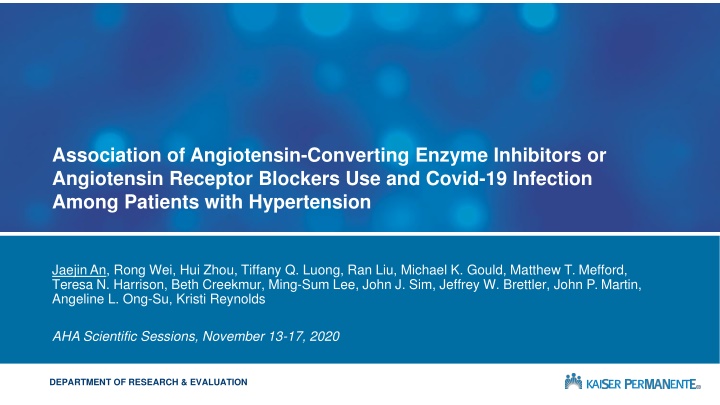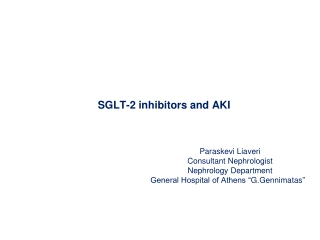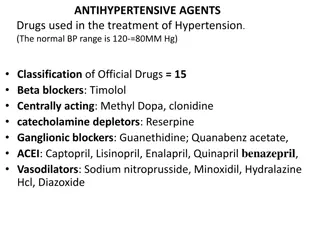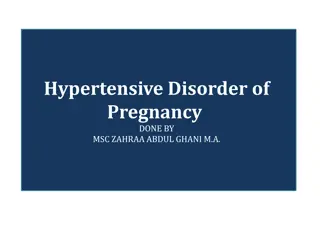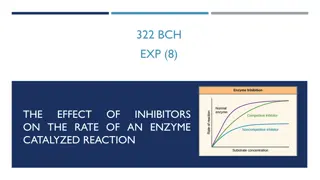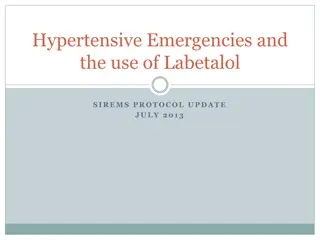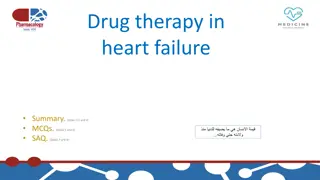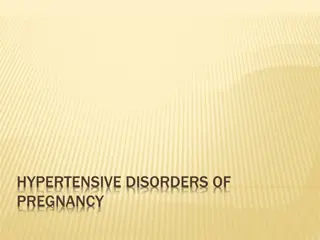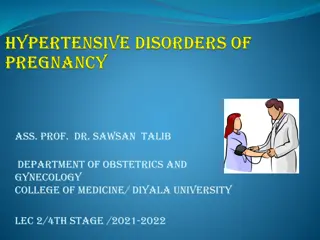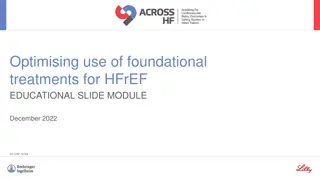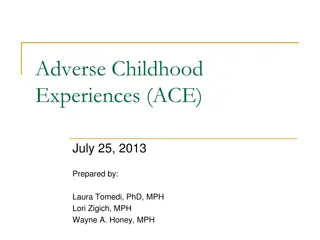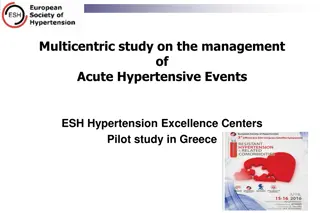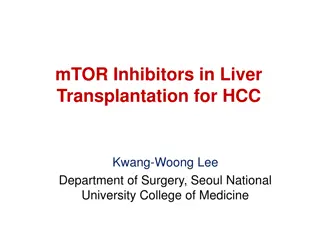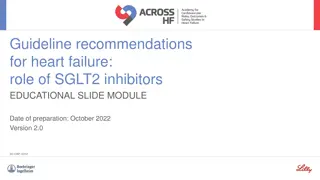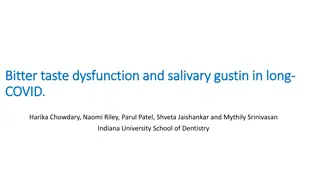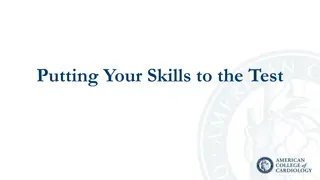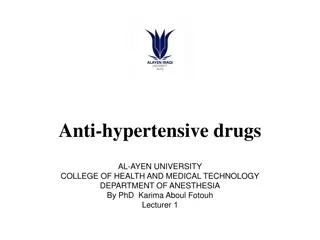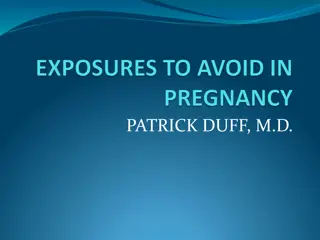Association of ACE Inhibitors or ARBs Use and Covid-19 Among Hypertensive Patients
The study investigates the relationship between ACE inhibitors, ARBs use, and Covid-19 infection in hypertensive patients. It explores the potential risks and benefits of these medications in relation to Covid-19 susceptibility. The study methodology involves a retrospective cohort analysis and statistical matching of patient demographics and clinical parameters to assess the impact of different antihypertensive medications on Covid-19 outcomes.
Download Presentation

Please find below an Image/Link to download the presentation.
The content on the website is provided AS IS for your information and personal use only. It may not be sold, licensed, or shared on other websites without obtaining consent from the author.If you encounter any issues during the download, it is possible that the publisher has removed the file from their server.
You are allowed to download the files provided on this website for personal or commercial use, subject to the condition that they are used lawfully. All files are the property of their respective owners.
The content on the website is provided AS IS for your information and personal use only. It may not be sold, licensed, or shared on other websites without obtaining consent from the author.
E N D
Presentation Transcript
Association of Angiotensin-Converting Enzyme Inhibitors or Angiotensin Receptor Blockers Use and Covid-19 Infection Among Patients with Hypertension Jaejin An, Rong Wei, Hui Zhou, Tiffany Q. Luong, Ran Liu, Michael K. Gould, Matthew T. Mefford, Teresa N. Harrison, Beth Creekmur, Ming-Sum Lee, John J. Sim, Jeffrey W. Brettler, John P. Martin, Angeline L. Ong-Su, Kristi Reynolds AHA Scientific Sessions, November 13-17, 2020 DEPARTMENT OF RESEARCH & EVALUATION
Disclosures This work was supported by the American Heart Association (AHA) grant #810957. Prior to AHA funding, part of this work was supported by the Regional Research Committee of Kaiser Permanente Southern California, grant #KP-RRC-20200402. JA reports grants from Novartis, Vital Strategies, and Merck & Co. outside the submitted work. RW and TQL report grants from Novartis and Vital Strategies outside the submitted work. KR reports grants from Novartis, Vital Strategies, Merck & Co., and Amgen outside the submitted work. HZ, MKG, MTM, TNH, BC, ML, JJS, JWB, JPM, and ALO have no financial disclosures.
Background The Covid-19 pandemic has generated concerns that use of angiotensin-converting enzyme inhibitors (ACEIs) or angiotensin receptor blockers (ARBs) may be associated with increased risk of Covid-19 infection or disease severity. ACEIs or ARBs may upregulate angiotensin-converting enzyme 2 (ACE2) receptors and increase SARS-CoV-2 infectivity.1 ACEIs or ARBs may be protective against Covid-19 by upregulating ACE2 and mitigating the inflammatory response in the lungs of infected patients.2 Epidemiologic studies have emerged to address this question, and these reports showed no increased risk of severity of Covid-19 associated with ACEI or ARB exposure.3-8 Limited information is available on the susceptibility of Covid-19.
Objective Determine the risk of Covid-19 infection among patients with hypertension taking ACEIs or ARBs, compared with other frequently used antihypertensive medications* within a large, diverse hypertension population at Kaiser Permanente Southern California. *Calcium channel blockers (CCB), beta-blockers (BB), thiazide or thiazide-like diuretics (TD)
Methods Retrospective Study Cohort Patients with hypertension as of March 1, 2020 (index date) from Kaiser Permanente Southern California Had a test for Covid-19 between March 1 May 6, 2020 Variables of Interest Exposure: 1) Any ACEIs 2) Any ARBs 3) CCB/BB/TD (reference group) 4) Other antihypertensives 5) No antihypertensives Outcome: Positive reverse transcription polymerase chain reaction (RT-PCR) test for Covid-19 Statistical Analysis Propensity score matching based on patient demographics, neighborhood income and education, insurance, body mass index, smoking, blood pressure, baseline comorbidities, and medication use.
Results Among 824,650 patients with hypertension, 16,898 (2.0%) were tested for Covid-19. Table 1. Patient demographic and clinical characteristics by antihypertensive drug exposure Other No ACEI ARB CCB or BB or TD 4,177 (25%) 4,878 (29%) 3,473 (21%) Antihypertensives 377 (2%) 71 58 Antihypertensives 3,993 (24%) 61 45 Age in years, mean Male, % Race/Ethnicity, % Asian Black Hispanic Other/Unknown White Blood Pressure, % <140/90 mm Hg <130/80 mm Hg Diabetes, % Heart failure, % Chronic kidney disease, % 64 53 66 40 65 39 11 12 36 2 39 20 14 31 2 33 14 18 27 2 39 7 15 28 2 48 12 14 39 2 33 82 44 46 7 10 80 40 49 8 14 82 43 29 10 14 87 53 39 19 18 72 36 28 3 6
Results Table 2. Incidence of Covid-19 Infection per 1000 Patients by Antihypertensive Drug Exposure ACEI ARB CCB or BB Other Anti- No Anti- or TD hypertensives hypertensives Covid-19 Infection per 1000 tested patients 107.6 102.8 81.9 58.4 137.2 (95% CI) (98.8-117.2) (92.7-114.0) (73.6-91.0) (38.4-88.6) (126.2-149.2) ACEI = angiotensin-converting enzyme inhibitors; ARB = angiotensin receptor blockers; BB = beta-blockers; CCB = calcium channel blockers; TD = thiazide diuretics
Results Figure 1. Odds Ratio (95% CI) of Covid-19 Infection Associated with Antihypertensive Drug Exposure Stratified by Sex, Age, and Race/ethnicity After Propensity Score Matching (A) ACEI vs. CCB/BB/TD (B) ARB vs. CCB/DD/TD (C) No antihypertensives vs. CCB/BB/TD
Summary of Findings/Discussion In our racially and ethnically diverse cohort, neither ACEI nor ARB use was associated with increased likelihood of Covid-19 infection. The decreased odds of Covid-19 infection among adults 85 years using ACEIs warrants further investigation. This study showed an increased likelihood of Covid-19 infection for those without antihypertensive medications compared to those with CCB/BB/TD. These results reinforce that patients with hypertension should continue their ACEIs or ARBs as recommended by scientific communities. Study has limitations from unmeasured confounding and changes in testing criteria for Covid-19.
References 1. Fang L, Karakiulakis G, Roth M. Are patients with hypertension and diabetes mellitus at increased risk for COVID-19 infection? Lancet Respir Med. 2020;8(4):e21. Vaduganathan M, Vardeny O, Michel T, McMurray JJV, Pfeffer MA, Solomon SD. Renin-Angiotensin-Aldosterone System Inhibitors in Patients with Covid-19. N Engl J Med. 2020;382(17):1653-1659. 2. 3. de Abajo FJ, Rodriguez-Martin S, Lerma V, et al. Use of renin-angiotensin-aldosterone system inhibitors and risk of COVID-19 requiring admission to hospital: a case-population study. Lancet. 2020;395(10238):1705-1714. 4. Fosbol EL, Butt JH, Ostergaard L, et al. Association of Angiotensin-Converting Enzyme Inhibitor or Angiotensin Receptor Blocker Use With COVID- 19 Diagnosis and Mortality. JAMA. 2020;324(2):168-177. 5. Mancia G, Rea F, Ludergnani M, Apolone G, Corrao G. Renin-Angiotensin-Aldosterone System Blockers and the Risk of Covid-19. N Engl J Med. 2020;382(25):2431-2440. Mehta N, Kalra A, Nowacki AS, et al. Association of Use of Angiotensin-Converting Enzyme Inhibitors and Angiotensin II Receptor Blockers With Testing Positive for Coronavirus Disease 2019 (COVID-19). JAMA Cardiol. 2020. 6. 7. Reynolds HR, Adhikari S, Pulgarin C, et al. Renin-Angiotensin-Aldosterone System Inhibitors and Risk of Covid-19. N Engl J Med. 2020;382(25):2441-2448. Vila-Corcoles A, Satue-Gracia E, Ochoa-Gondar O, et al. Use of distinct anti-hypertensive drugs and risk for COVID-19 among hypertensive people: a population-based cohort study in Southern Catalonia, Spain. J Clin Hypertens (Greenwich). 2020. 8.
